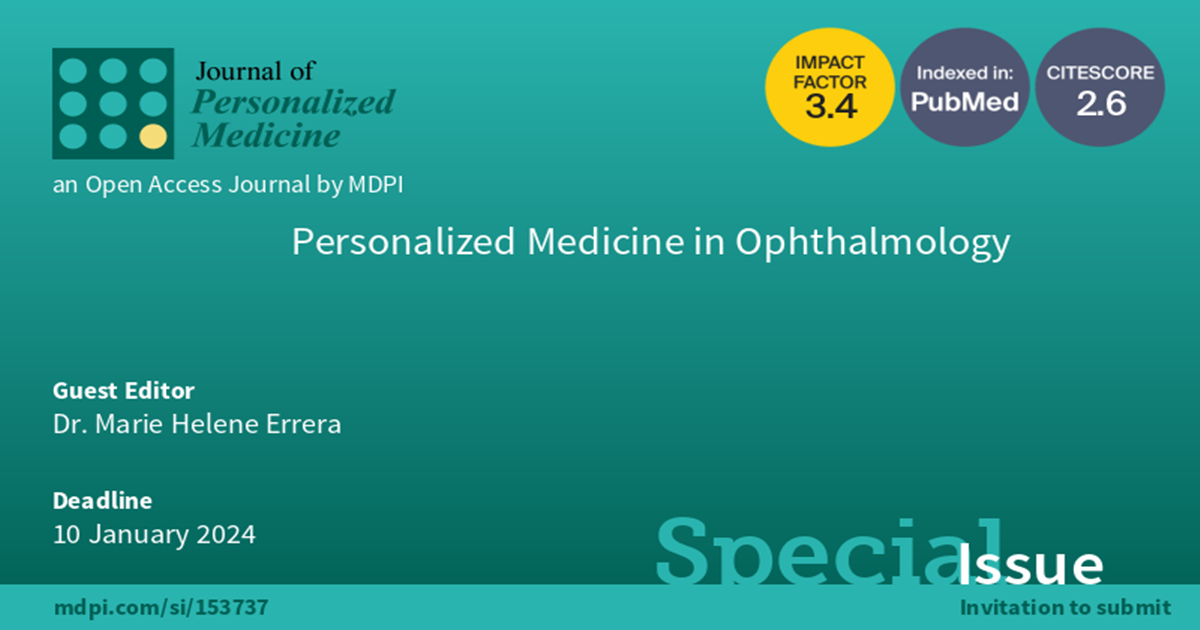Personalized Medicine in Ophthalmology
A special issue of Journal of Personalized Medicine (ISSN 2075-4426). This special issue belongs to the section "Personalized Therapy in Clinical Medicine".
Deadline for manuscript submissions: closed (10 January 2024) | Viewed by 548

Special Issue Editor
Interests: immunology; uveitis; retina; pediatric ophthalmology
Special Issue Information
Dear Colleagues,
Medical practice is moving toward precision medicine. Advances in our understanding of the pathophysiology of various eye disorders have enabled the identification of the following implications:
- Clinical features, such as (1) iatrogenic Vogt-Koyanagi-Harada, which could be triggered by the checkpoint inhibitors that block PD-L1, and T cells specific for melanocytes may be activated; (2) the use of optical coherence tomography (OCT) angiography to detect macular microvascular abnormalities in sickle cell disease, involving both the superficial and the deep capillary plexuses, among many others;
- The development of precise diagnostic methods, such as devices for anterior segment imaging (anterior segment OCT, corneal topography, specular microscopy, confocal microscopy, ultrasound biomicroscopy, and ocular response analyzers), has enabled detailed observations of anterior segment structures, contributing to improved visual outcomes after cornea, cataract, and refractive surgeries;
- The development of targeted therapies, such as (1) gene therapy and stem cell therapy approaches for the treatment of retinal disorders; (2) measuring serum drug levels and antidrug antibodies of adalimumab for guiding the management of patients with chronic non-infectious uveitis; or (3) the newest treatment options for managing glaucoma (the nitric oxide-donating prostaglandins and Rho kinase inhibitors) or for exudative age-related macular degeneration with longer-lasting anti-VEGF.
This Special Issue invites research articles, reviews, and communications, including but not limited to, those that address the following topics: comprehensive ophthalmology, glaucoma, cornea, oculoplastics, retina, and vitreous diseases.
Dr. Marie Helene Errera
Guest Editor
Manuscript Submission Information
Manuscripts should be submitted online at www.mdpi.com by registering and logging in to this website. Once you are registered, click here to go to the submission form. Manuscripts can be submitted until the deadline. All submissions that pass pre-check are peer-reviewed. Accepted papers will be published continuously in the journal (as soon as accepted) and will be listed together on the special issue website. Research articles, review articles as well as short communications are invited. For planned papers, a title and short abstract (about 100 words) can be sent to the Editorial Office for announcement on this website.
Submitted manuscripts should not have been published previously, nor be under consideration for publication elsewhere (except conference proceedings papers). All manuscripts are thoroughly refereed through a single-blind peer-review process. A guide for authors and other relevant information for submission of manuscripts is available on the Instructions for Authors page. Journal of Personalized Medicine is an international peer-reviewed open access monthly journal published by MDPI.
Please visit the Instructions for Authors page before submitting a manuscript. The Article Processing Charge (APC) for publication in this open access journal is 2600 CHF (Swiss Francs). Submitted papers should be well formatted and use good English. Authors may use MDPI's English editing service prior to publication or during author revisions.
Keywords
- ophthalmology
- retina
- vitreous diseases
- cornea
- glaucoma
- oculoplastics
- personalized medicine
- precision medicine
Benefits of Publishing in a Special Issue
- Ease of navigation: Grouping papers by topic helps scholars navigate broad scope journals more efficiently.
- Greater discoverability: Special Issues support the reach and impact of scientific research. Articles in Special Issues are more discoverable and cited more frequently.
- Expansion of research network: Special Issues facilitate connections among authors, fostering scientific collaborations.
- External promotion: Articles in Special Issues are often promoted through the journal's social media, increasing their visibility.
- Reprint: MDPI Books provides the opportunity to republish successful Special Issues in book format, both online and in print.
Further information on MDPI's Special Issue policies can be found here.





